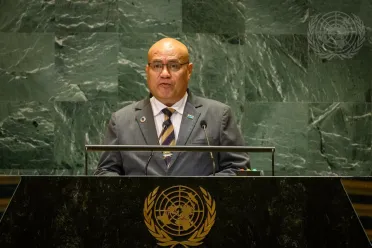Statement
Statement summary
FELETI PENITALA TEO, Prime Minister of Tuvalu, said the international community must advance “in unity as a family of nations” while recognizing the inherent disparities in each country’s development capacity. Trailing on the lower end of the global economic scale, the least developed countries and small island developing States face persistent and significant financial challenges in their development efforts. With an import-oriented economy, Tuvalu’s economic fragility is further intensified by poor natural endowment, geographical isolation from major markets and environmental vulnerability to climatic crisis. “All individuals should have access to resources and opportunities to participate in international decision-making processes to effectively respond to global challenges,” he said, adding that “it is regrettable that the Republic of China (Taiwan) is still excluded from the United Nations system despite its significant contributions and partnerships across various development sectors”. He also regretted that the Cuban people “continue to bear the economic burden of long-standing unilateral economic blockades”, calling for the blockades’ lifting and for Cuba’s removal from the list of States sponsoring terrorism.
Noting the changing climate’s disproportionate impact on small island developing States like his, he urged all Member States to honour their commitments for climate finance and technology transfer to help these nations develop and enhance their adaptative resilience. “Phasing out fossil fuels is crucial to global efforts to reduce carbon emissions and curb global warming,” he said. He backed the Fossil Fuel Non-Proliferation Treaty initiative. Climate change-induced sea level rise is not only a top development priority, but a “top survivability priority” for Tuvalu. Current predictions that by 2050 more than 50 per cent of Tuvalu’s land territory will be regularly flooded by regular tidal surges are “frighteningly disturbing”. Fifty years later, in 2100, more than 90 per cent of its land territory will suffer the same fate.
He said the Assembly’s high-level meeting on sea level rise, held 25 September, marks the international community’s take-off to shape an ambitious Declaration in September 2026. That document should support the 1 billion people affected by rising sea levels with specific actions and principles. “The Declaration shall be an unwavering commitment to our sovereignty, dignity, prosperity and rights,” he said. It will establish the principle of statehood continuity as a tenet of international law and international cooperation and “affirm that statehood cannot be challenged under any circumstances of sea level rise”, he added. It should also reaffirm the permanency of maritime zones established in line with the United Nations Convention on the Law of the Sea and devise concrete programmes for the international community to support countries’ efforts to safeguard their unique culture and heritage, plus establish dedicated and innovative financing mechanisms to support the positive adaptation journeys of the most vulnerable communities.
On 5 September, Tuvalu celebrated its twenty-fourth anniversary of UN membership. “Tuvalu remains grateful for the privilege to engage with other Member States in our common pursuit for the advancement of peace and security, sustainable development and human dignity for present and future generations,” he said. The country will celebrate its forty-sixth independence anniversary on 1 October. He hoped that commitment to the Pact for the Future and the accompanying Declaration and Compact adopted during the Summit earlier this week provides the much-needed reboot to the global multilateralism architecture and the UN systems generally. “The global community must seize this opportunity to reaffirm and recommit to multilateralism and international cooperation, to the SDGs and to the principles of the United Nations Charter,” he said, urging all to rally behind the Pact to build a more equitable global system where no nation or community is left behind.
Feleti Penitala Teo, Prime Minister of Tuvalu, said that as a small island, climate change-induced sea-level rise “is and will always be” a top priority for his country.
“Not only a development priority but also a top survivability one,” he stressed, warning that the Pacific Ocean “that used to define us would soon engulf us and determine our future existence”, if sea level rise is not halted and Tuvalu’s coastlines not fortified and reinforced.
He cited “frighteningly disturbing” sea-level rise estimates that by 2050 – 26 years away –more than 50 per cent of his nation’s land territory will be regularly flooded by regular tidal surges.
Fifty years after that, in 2100, more than 90 per cent of the land will suffer the same fate, he added.
These predictions, he said, do not account for severe climatic conditions like cyclones and hurricanes which would “exponentially accelerate” the odds of reaching of those thresholds.
Full statement
Read the full statement, in PDF format.
Photo

Previous sessions
Access the statements from previous sessions.
